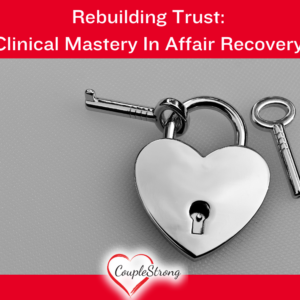Rebuilding Trust: Clinical Mastery In Affair Recovery
Helping couples heal after infidelity requires deep understanding and specialized tools. CoupleStrong’s Affair Recovery Training provides licensed therapists with a comprehensive, evidence-based approach to guiding couples through the emotional, psychological, and relational complexities of affair recovery.
This training is based on Shirley Glass's groundbreaking work (Not Just Friends), delivering proven strategies to rebuild trust, foster communication, and restore intimacy in relationships. Whether you’re an experienced clinician or looking to expand your expertise, this workshop equips you with the tools to help couples navigate one of the most challenging relationship crises.
What’s Included:
- Comprehensive Training Manual: A detailed guide featuring key insights and tools for affair recovery.
- Earn 9 APA-Approved Continuing Education (CE) Credits Included- Accredited hours for professional development and licensure requirements.
- Evidence-Based Approach: Techniques rooted in research and best practices for infidelity recovery.
- Interactive Sessions: Learn through real-life examples, case studies, and guided discussions.
- Post-Training Resources: Access to ongoing support materials to enhance your practice.
Who Is This Training For?
This workshop is ideal for licensed professionals and relationship coaches seeking to deepen their knowledge and skills:
- Licensed Marriage and Family Therapists (LMFTs)
- Licensed Professional Counselors (LPCs)
- Licensed Mental Health Counselors (LMHCs)
- Licensed Clinical Social Workers (LCSWs)
- Psychologists
- Certified Coaches working with couples
- Christian Counselors or Clergy
Training Objectives:
By the end of this workshop, you will be able to:
- Understand the Impact of Infidelity: Identify the emotional and psychological effects of affairs on individuals and relationships.
- Apply Shirley Glass’ Key Concepts: Implement strategies from Not Just Friends, including boundary-setting and rebuilding trust.
- Facilitate Healing Conversations: Equip couples with communication tools to process betrayal and foster understanding.
- Rebuild Trust and Prevent Relapse: Guide couples through actionable steps to regain trust and prevent future betrayals.
- Address Emotional and Physical Affairs: Differentiate between types of infidelity and tailor interventions accordingly.
- Support Long-Term Relationship Goals: Help couples move beyond the affair to build stronger, healthier connections.
Why Attend CoupleStrong’s Affair Recovery Training?
Infidelity is one of the most common yet challenging issues couples face. As a therapist, your ability to effectively support couples through this crisis can transform lives and relationships.
Through this training, you’ll gain specialized expertise, research-backed tools, and the confidence to help couples not only recover from an affair but thrive in its aftermath.
Register Now!
Don’t miss this opportunity to enhance your practice and provide life-changing support to couples in need.
Comprehensive Workshop Outline
This training, inspired by Shirley Glass’s groundbreaking work Not Just Friends, provides therapists with the tools and insights needed to guide couples through the complexities of infidelity recovery. Below is the full outline, encompassing all critical chapters to ensure a thorough and transformative learning experience.
I. Understanding Infidelity
Objective: Build foundational knowledge about infidelity's dynamics and its impact on relationships.
1. What is Infidelity?
- Definitions: Emotional, physical, and online affairs.
- Cultural and societal perspectives.
- Misconceptions and myths about infidelity.
2. Causes of Affairs
- Personal vulnerabilities vs. relational issues.
- The role of opportunity and risk factors.
- Unmet needs and unspoken expectations.
3. Impact of Infidelity
- The emotional and psychological toll on both partners.
- Effects on relational trust and intimacy.
- The ripple effect on families and social networks.
II. Betrayed - The Partners Journey
Objective: Equip therapists to support the betrayed partner’s healing process.
1. Initial Reactions to Betrayal
- Emotional stages: Shock, denial, and anger.
- Coping mechanisms: Healthy vs. destructive.
2. Rebuilding Self-Worth
- Addressing self-doubt and shame.
- Encouraging self-care and support systems.
3. Processing the Pain
- Validating emotions.
- Techniques for managing intrusive thoughts and triggers.
III. The Unfaithful Partner's Role
Objective: Guide unfaithful partners in taking accountability and fostering repair.
1. Understanding their actions
- Exploring motives and contributing factors.
- Distinguishing between remorse and regret
2. Accountability and transparency
- Full disclosure: When, how, and why.
- Setting boundaries to rebuild trust.
3. Rebuilding Credibility
- Consistency in actions and words.
- Showing empathy for the betrayed partner’s pain.
IV. Rebuilding Trust and Connection
Objective: Introduce strategies to help couples restore relational trust and intimacy.
1. Steps to Rebuild Trust
- Establishing safety and stability.
- Creating and maintaining boundaries.
2. Fostering Emotional Intimacy
- Techniques for open communication and vulnerability.
- Rebuilding friendship and shared meaning.
3. Physical Intimacy After Betrayal
- Addressing fears and resistance.
- Reestablishing closeness and comfort in intimacy.
V. Navigating Emotional and Physical Affairs
Objective: Help therapists differentiate and tailor interventions for various types of affairs.
1. Emotional Affairs
- The blurred line between friendships and emotional infidelity.
- How emotional affairs erode trust.
2. Physical Affairs
- Addressing the fallout of physical betrayal.
- Exploring relational and emotional gaps that contributed to the affair.
3. Online and Technology-Facilitated Affairs
- The role of social media and dating apps.
- Setting digital boundaries.
VI. Preventing Relapse and Future Betrayals
Objective: Equip couples with tools to safeguard their relationship.
1. Identifying and Addressing Vulnerabilities
- Strengthening relationship “weak spots.”
- Building a shared vision for the future.
2. Creating Healthy Boundaries
- Individual and relational boundaries for trust maintenance.
- Strategies to navigate external temptations.
3. Developing New Patterns of Connection
- Establishing rituals of connection.
- The importance of consistent emotional “check-ins.”
VII. Long-Term Healing and Growth
Objective: Support couples in using the affair as a catalyst for positive relational transformation.
1. Moving Beyond Affair
- Helping couples integrate the affair into their relational narrative.
- Emphasizing resilience and growth.
2. Restoring Hope and Joy
- Celebrating milestones in recovery.
- Reigniting passion and shared goals.
3. Therapist Role in Long-Term Support
- Identifying when ongoing therapy is needed.
- Encouraging couples to embrace their new normal.
VII. Therapist's Toolkit of Affair Recovery
Objective: Provide therapists with practical tools and interventions for effective work.
1. Assessment Tools
- Recognizing the affair's impact on the relationship.
- Identifying individual and relational strengths.
2. Interventions and Techniques
- Recognizing the affair's impact on the relationship.
- Identifying individual and relational strengths.
3. Case Studies and Role-Playing
- Real-life scenarios to illustrate key techniques.
- Practicing responses to challenging client dynamics.
IX. Addressing Ethical Considerations and Challenges
Objective: Discuss the ethical dimensions of working with infidelity.
1. Maintaining Professional Boundaries
- Avoiding triangulation and taking sides.
- Balancing empathy with objectivity.
2. Confidentiality in Affair Recovery
- Managing disclosures between partners.
- Legal and ethical considerations for therapists.
3. Navigating Complex Scenarios
- What to do when one partner is unwilling to engage.
- Handling ongoing secrecy or resistance.
Select an Upcoming Training Session
-
Payment Plan Fee
$20.00 -
Rebuilding Trust: Clinical Mastery In Affair Recovery Ft. Lauderdale, FL Feb 14, 2026
Original price was: $400.00.$300.00Current price is: $300.00. -
Rebuilding Trust: Clinical Mastery In Affair Recovery Virtual via ZOOM Apr 25, 2026
Original price was: $400.00.$300.00Current price is: $300.00.


